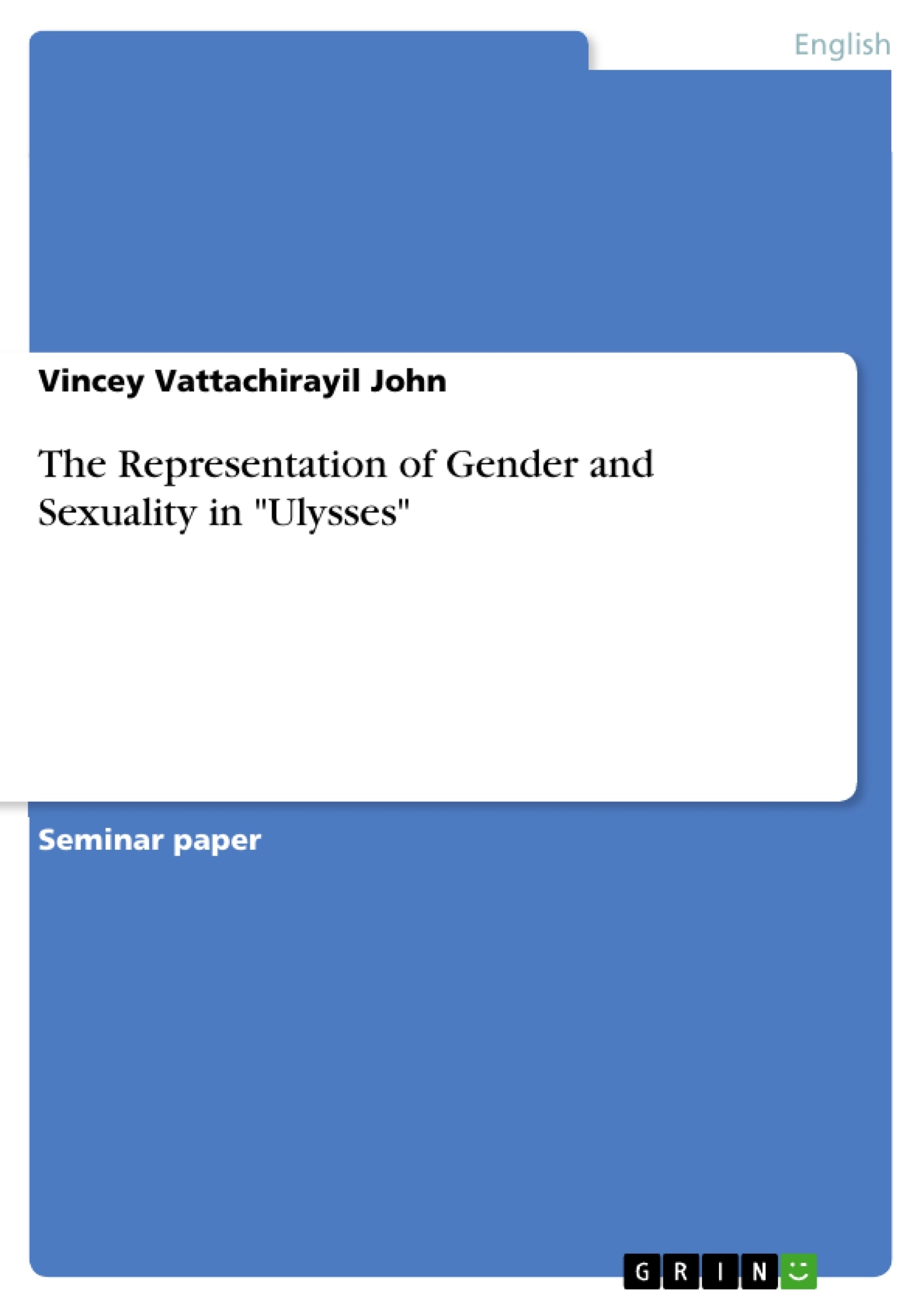Ulysses, written by James Joyce, has various aspects, thus it is rather complex to comprehend the main topics. It implies one’s everyday life in Dublin of the time, interpersonal relationships including love and family relationship, Judaism and the Roman Catholic Church, English and Irish history and sundry other topics. It is also generally known as a modern Odyssey, a novel that reduces space and time. Alternatively, Hayman claims that Joyce’s writing is extraordinarily autobiographical; hence the protagonist Leopold Bloom’s character traits possibly bear resemblance to Joyce’s character traits. Assuming Ulysses refers to Joyce’s real life, many questions and concerns rise regarding the sexuality in the novel and indeed the protagonists Bloom and Molly Bloom since it had even been censored, criticised, and barred from the United States attributable to obscenity.
The study of gender and sexuality in Ulysses will be the main aim of this paper. The main focus will be on Molly, who is one of the most discussed fictive characters yet the least understood one. Opinions differ when one examines Molly since her performance to her family and acquaintances are rather uncharacteristic of the time of Modernism. Especially her submissiveness to her husband, which is rather expected, is absent. Thus, it is particularly challenging to decipher whether she represents the “earth mother” or the “satanic mistress”. Moreover, it will be discussed about Bloom, who is the main protagonist, however, who has been set as the anti-hero. Additionally, Bloom’s and Joyce’s influence on Molly’s affair will be deepened to make an attempt to comprehend Molly’s character easier.
Inhaltsverzeichnis (Table of Contents)
- Introduction
- The Representation of Gender and Sexuality in Ulysses
- Molly
- A World of Its Own
- The Role as a Mother
- Motives for Infidelity
- Gea Tellus or Satanic Mistress
- Bloom as the Modern Antihero
- Molly
- Bloom's and Joyce's Role in Molly's Affair
- Conclusion
- Bibliography
Zielsetzung und Themenschwerpunkte (Objectives and Key Themes)
This paper aims to explore the representation of gender and sexuality in James Joyce's Ulysses, focusing particularly on the character of Molly Bloom, who is often discussed but rarely understood. The study will examine Molly's complex portrayal, considering her perceived defiance of societal expectations for women in the early 20th century. It will also explore Bloom's role as the modern anti-hero and analyze how his interactions and Joyce's own influence might have contributed to Molly's affair.
- The representation of gender and sexuality in Ulysses
- Molly Bloom's complex character and her defiance of societal expectations
- The portrayal of Bloom as the modern anti-hero
- The influence of Joyce's own life and perspectives on the narrative
- The impact of societal norms and the changing role of women in early 20th century literature
Zusammenfassung der Kapitel (Chapter Summaries)
The introduction provides an overview of the complexities of Ulysses, highlighting its diverse themes including everyday life in Dublin, interpersonal relationships, religion, and history. The paper focuses specifically on the representation of gender and sexuality, particularly the portrayal of Molly Bloom. The introduction also examines the role of Leopold Bloom as the modern anti-hero and the potential influence of Joyce's own life on the narrative.
The chapter on "The Representation of Gender and Sexuality in Ulysses" provides a theoretical framework for understanding gender and sexuality in the context of the novel. It explores the concept of gender as defined by Diamond, highlighting the distinction between biological sex and social/cultural gender. The chapter also discusses the historical context of women's subordination and its potential impact on Molly's character.
The section on Molly Bloom delves into her character, examining her portrayal in the novel and contrasting her with the more transparent character of Bloom. The chapter explores Molly's perceived defiance of societal norms, highlighting her sexuality, agency, and potential disregard for conventional expectations. The chapter also explores the question of whether she represents the archetypal "earth mother" or the "satanic mistress."
Schlüsselwörter (Keywords)
The core concepts of this analysis include gender, sexuality, representation, modernism, antihero, societal expectations, Molly Bloom, Leopold Bloom, James Joyce, and Ulysses. The paper examines the complex interplay of these concepts in Joyce's novel, highlighting the portrayal of gender and sexuality within the broader social and historical context of early 20th century Ireland.
Frequently Asked Questions
Who is the primary focus of the gender study in James Joyce's Ulysses?
The study focuses particularly on Molly Bloom, exploring her complex character and her defiance of early 20th-century societal expectations for women.
How is Leopold Bloom characterized in the novel?
Leopold Bloom is portrayed as a modern anti-hero, serving as a contrast to traditional heroic figures.
What are the two contrasting archetypes often associated with Molly Bloom?
Critics and scholars often debate whether Molly represents the "earth mother" (Gea Tellus) or a "satanic mistress."
Why was Ulysses historically controversial in the United States?
The novel was censored, criticized, and barred from the United States for a period due to allegations of obscenity.
Does the character of Leopold Bloom have biographical connections to James Joyce?
Yes, scholars like Hayman claim that Joyce’s writing is autobiographical and that Bloom's traits may resemble those of Joyce himself.
What themes does Ulysses cover besides gender and sexuality?
The novel covers everyday life in Dublin, interpersonal relationships, Judaism, the Roman Catholic Church, and English and Irish history.
- Citation du texte
- Vincey Vattachirayil John (Auteur), 2009, The Representation of Gender and Sexuality in "Ulysses", Munich, GRIN Verlag, https://www.grin.com/document/167170



